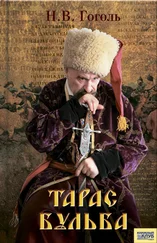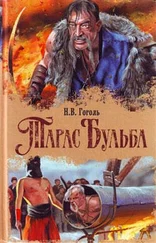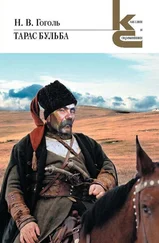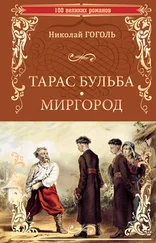| Welcome, lads; you, Ostap, and you, Andrii. |
Будьте здоровы, сынки: и ты, Остап, и ты, Андрий! |
| God grant that you may always be successful in war, that you may beat the Musselmans and the Turks and the Tatars; and that when the Poles undertake any expedition against our faith, you may beat the Poles. |
Дай же боже, чтоб вы на войне всегда были удачливы! Чтобы бусурменов били, и турков бы били, и татарву били бы; когда и ляхи начнут что против веры нашей чинить, то и ляхов бы били! |
| Come, clink your glasses. How now? Is the brandy good? |
Ну, подставляй свою чарку; что, хороша горелка? |
| What's corn-brandy in Latin? |
А как по-латыни горелка? |
| The Latins were stupid: they did not know there was such a thing in the world as corn-brandy. |
То-то, сынку, дурни были латынцы: они и не знали, есть ли на свете горелка. |
| What was the name of the man who wrote Latin verses? |
Как, бишь, того звали, что латинские вирши писал? |
| I don't know much about reading and writing, so I don't quite know. Wasn't it Horace?" |
Я грамоте разумею не сильно, а потому и не знаю: Гораций, что ли? |
| "What a dad!" thought the elder son Ostap. "The old dog knows everything, but he always pretends the contrary." |
"Вишь, какой батько! - подумал про себя старший сын, Остап, - все старый, собака, знает, а еще и прикидывается". |
| "I don't believe the archimandrite allowed you so much as a smell of corn-brandy," continued Taras. "Confess, my boys, they thrashed you well with fresh birch-twigs on your backs and all over your Cossack bodies; and perhaps, when you grew too sharp, they beat you with whips. |
- Я думаю, архимандрит не давал вам и понюхать горелки, - продолжал Тарас. - А признайтесь, сынки, крепко стегали вас березовыми и свежим вишняком по спине и по всему, что ни есть у козака? А может, так как вы сделались уже слишком разумные, так, может, и плетюганами пороли? |
| And not on Saturday only, I fancy, but on Wednesday and Thursday." |
Чай, не только по субботам, а доставалось и в середу и в четверги? |
| "What is past, father, need not be recalled; it is done with." |
- Нечего, батько, вспоминать, что было, - отвечал хладнокровно Остап, - что было, то прошло! |
| "Let them try it know," said Andrii. "Let anybody just touch me, let any Tatar risk it now, and he'll soon learn what a Cossack's sword is like!" |
- Пусть теперь попробует! - сказал Андрий. -Пускай только теперь кто-нибудь зацепит. Вот пусть только подвернется теперь какая-нибудь татарва, будет знать она, что за вещь козацкая сабля! |
| "Good, my son, by heavens, good! |
- Добре, сынку! ей-богу, добре! |
| And when it comes to that, I'll go with you; by heavens, I'll go too! |
Да когда на то пошло, то и я с вами еду! ей-богу, еду! |
| What should I wait here for? |
Какого дьявола мне здесь ждать? |
| To become a buckwheat-reaper and housekeeper, to look after the sheep and swine, and loaf around with my wife? |
Чтоб я стал гречкосеем, домоводом, глядеть за овцами да за свиньями да бабиться с женой? |
| Away with such nonsense! I am a Cossack; I'll have none of it! |
Да пропади она: я козак, не хочу! |
| What's left but war? |
Так что же, что нет войны? |
| I'll go with you to Zaporozhe to carouse; I'll go, by heavens!" |
Я так поеду с вами на Запорожье, погулять. |
| And old Bulba, growing warm by degrees and finally quite angry, rose from the table, and, assuming a dignified attitude, stamped his foot. "We will go to-morrow! |
Ей-богу, поеду! - И старый Бульба мало-помалу горячился, горячился, наконец рассердился совсем, встал из-за стола и, приосанившись, топнул ногою. - Затра же едем! |
| Wherefore delay? |
Зачем откладывать! |
| What enemy can we besiege here? |
Какого врага мы можем здесь высидеть? |
| What is this hut to us? |
На что нам эта хата? |
| What do we want with all these things? |
К чему нам все это? |
| What are pots and pans to us?" So saying, he began to knock over the pots and flasks, and to throw them about. |
На что эти горшки? - Сказавши это, он начал колотить и швырять горшки и фляжки. |
| The poor old woman, well used to such freaks on the part of her husband, looked sadly on from her seat on the wall-bench. |
Бедная старушка, привыкшая уже к таким поступкам своего мужа, печально глядела, сидя на лавке. |
| She did not dare say a word; but when she heard the decision which was so terrible for her, she could not refrain from tears. As she looked at her children, from whom so speedy a separation was threatened, it is impossible to describe the full force of her speechless grief, which seemed to quiver in her eyes and on her lips convulsively pressed together. |
Она не смела ничего говорить; но услыша о таком страшном для нее решении, она не могла удержаться от слез; взглянула на детей своих, с которыми угрожала ей такая скорая разлука, - и никто бы не мог описать всей безмолвной силы ее горести, которая, казалось, трепетала в глазах ее и в судорожно сжатых губах. |
| Bulba was terribly headstrong. |
Бульба был упрям страшно. |
| He was one of those characters which could only exist in that fierce fifteenth century, and in that half-nomadic corner of Europe, when the whole of Southern Russia, deserted by its princes, was laid waste and burned to the quick by pitiless troops of Mongolian robbers; when men deprived of house and home grew brave there; when, amid conflagrations, threatening neighbours, and eternal terrors, they settled down, and growing accustomed to looking these things straight in the face, trained themselves not to know that there was such a thing as fear in the world; when the old, peacable Slav spirit was fired with warlike flame, and the Cossack state was instituted-a free, wild outbreak of Russian nature-and when all the river-banks, fords, and like suitable places were peopled by Cossacks, whose number no man knew. Their bold comrades had a right to reply to the Sultan when he asked how many they were, |
Это был один из тех характеров, которые могли возникнуть только в тяжелый ХV век на полукочующем углу Европы, когда вся южная первобытная Россия, оставленная своими князьями, была опустошена, выжжена дотла неукротимыми набегами монгольских хищников; когда, лишившись дома и кровли, стал здесь отважен человек; когда на пожарищах, в виду грозных соседей и вечной опасности, селился он и привыкал глядеть им прямо в очи, разучившись знать, существует ли какая боязнь на свете; когда бранным пламенем объялся древле мирный славянский дух и завелось козачество - широкая, разгульная замашка русской природы, - и когда все поречья, перевозы, прибрежные пологие и удобные места усеялись козаками, которым и счету никто не ведал, и смелые товарищи их были вправе отвечать султану, пожелавшему знать о числе их: |
| "Who knows? We are scattered all over the steppes; wherever there is a hillock, there is a Cossack." |
"Кто их знает! у нас их раскидано по всему степу: что байрак, то козак" (что маленький пригорок, там уж и козак). |
| It was, in fact, a most remarkable exhibition of Russian strength, forced by dire necessity from the bosom of the people. |
Это было, точно, необыкновенное явленье русской силы: его вышибло из народной груди огниво бед. |




